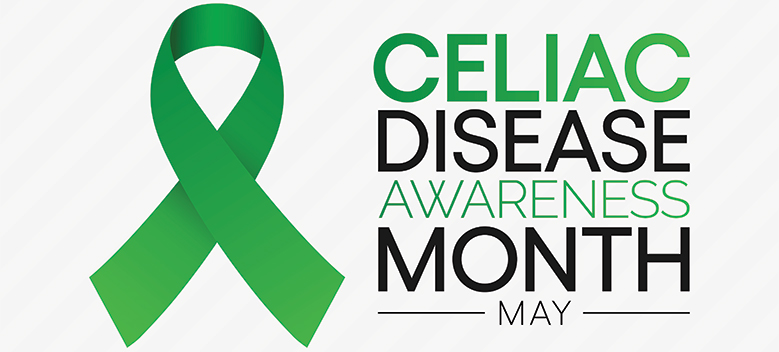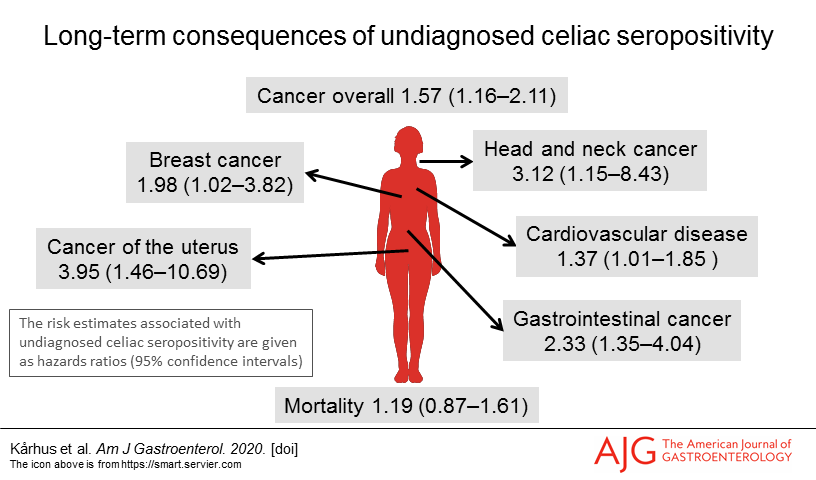New research on consequences of undiagnosed Coeliac Disease

The past year was for medical professionals a time with increased focus on the COVID epidemic which so deeply affected all our lives.
That have not stopped however important research being conducted, among others into Coeliac Disease (CD). Two very interesting articles dealing with consequences of coeliac disease were published in respected medical journals. Nature Reviews Gastroenterology & Hepatology have published “Updates on systemic consequences of coeliac disease” and The American Journal of Gastroenterology (AJG) “Long-term Consequences of Undiagnosed Celiac Seropositivity”. Both articles present current state of the research into long-term consequences of Coeliac Disease.
The AJG article reports results of a study conducted on screening of over 16 thousand samples from a biobank taken from patients over the course of 36 years. They were checked for presence of antibodies and then registered as undiagnosed CD where the patient had no diagnosis of CD. The results of the study shown that there was a significant association between increased risk of cancer overall, with higher risks of cancer of uterus or head and neck cancer.
The graphics below displays the findings:

The figures in this graphic represent the hazard ratios and they should be read as laid out in the example of "Cancer of the uterus":
3.95 – at any time patients in the sample group were 3.95 times more likely to develop cancer than individuals from control group
(1.46 – 10.69) – the results are presented with 95% confidence that patients in the study group were 1.46 to 10.69 times more likely to develop cancer.
The article from Nature Reviews concentrated on studies that tried to establish what are the consequences of Coeliac Disease on the whole system of human body. Although the disease affects mainly small intestine, eating of gluten can lead to its manifestation outside of the intestine in large proportion (up to 60%) of people with genetical predisposition.
In 2020 researchers in Sheffield conducted a study on independent data from the National UK Biobank from half a million volunteered adults. After they have compared them with healthy individuals, over a hundred were reported to show signs of cognitive problems like slower reaction times (widely reported symptom of CD patients is what they have been describing as “brain fog”). Significantly higher proportion of participants had anxiety, depression, and even experienced thoughts of self-harm. The study suggests that CD could be associated with brain injury and neuropsychological problems. MRI investigations were showing changes to the white matter in the brain. The cells in our brains regenerate poorly after exposition to gluten and if neurological defects occur, they can accumulate with time.
The results of these studies are subject to further scrutiny and doubts about their importance remain. However, the neuropsychological problems manifesting in CD are often mild which results in them being undiagnosed by non-specialist doctors.
Kårhus, Line Lund MD, PhD1; Skaaby, Tea MD, PhD, DMSci1; Petersen, Janne PhD1,2; Madsen, Anja Lykke PhD3; Thuesen, Betina Heinsbæk PhD1; Schwarz, Peter DMSCI, MD4,5; Rumessen, Jüri J. DMSci, MD6; Linneberg, Allan MD, PhD1,5 Long-term Consequences of Undiagnosed Celiac Seropositivity, The American Journal of Gastroenterology: October 2020 - Volume 115 - Issue 10 - p 1681-1688 doi: 10.14309/ajg.0000000000000737
Kaukinen, K. Updates on systemic consequences of coeliac disease. Nat Rev Gastroenterol Hepatol 18, 87–88 (2021). https://doi.org/10.1038/s41575-020-00387-0